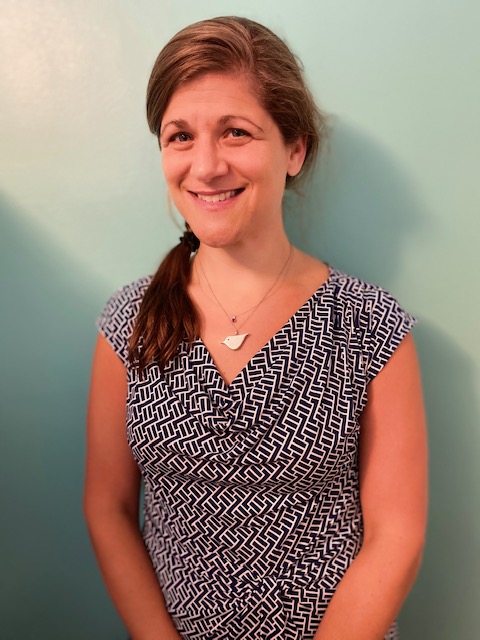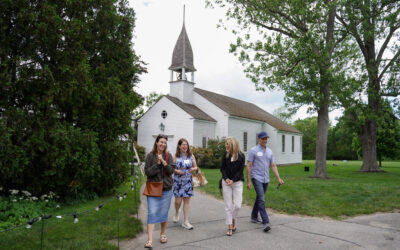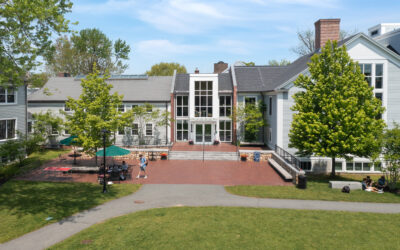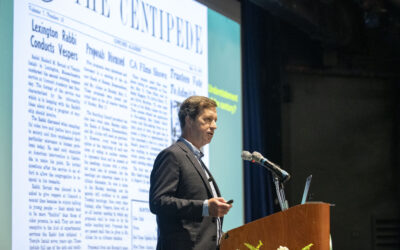Kate Lauriat Saunders ’96 directs clinical nutrition for the two campuses of the UMass Memorial Medical Center in Worcester, Mass. As the COVID-19 pandemic surged in the state this spring, she took on the additional role of collaboratively overseeing food service and clinical nutrition for the temporary field hospital that was set up at Worcester’s DCU Center convention facility to care for COVID-19 patients. At UMass, in order to preserve personal protective equipment for front-line staff, nutritional assessments have all taken place remotely. “I see the individuals doing front-line care of these patients, who are at their bedsides,” Saunders says. “The emotional and physical fatigue is very real, and I want to acknowledge their truly heroic effort.
Although Saunders doesn’t work directly in the COVID-19 units, she manages the UMass system’s more than 30 dietitians, coordinating their nutritional care of adult and pediatric in-patients and out-patients. Adapting to the many clinical demands of this illness, Saunders’ team has worked closely with various departments as part of the hospitals’ coordinated care for COVID-19 patients. “We partnered early on with pulmonologists and the critical care community,” Saunders says. “They’ve been amazing to work with to ensure we’re providing optimal nutritional care for our patients. And our health care system, from the executive leadership to the frontline staff, is so robust here at UMass.”
The pandemic has posed some unique challenges for making sure patients are getting the nutrition they need to recover from such serious illness. “In terms of a clinical workflow, this disease state is one we’ve not encountered previously,” Saunders says. Many COVID-19 patients require enteral nutrition, especially the critically ill who need ventilator support. Medical management of COVID-19 patients often involves proning therapy, or face-down positioning to improve lung function. Because of an increased risk of aspiration and other complications associated with that position, feeding prone patients is challenging. And patients who have been ill for many weeks may experience loss of appetite, food aversions, and difficulty swallowing. Patients with chronic conditions, such as diabetes and heart disease, may arrive acutely ill and then quickly deteriorate, and Saunders has focused on adjusting nutritional recommendations for these patients, focusing proactively on sparing lean body mass and decreasing the development of micronutrient deficiencies.

“Food is a universally understood language. Everyone knows how to care for someone using food as part of their long-term therapy.”
– Kate Lauriat Saunders ’96
“If they’re malnourished, patients are just going to do worse from a variety of standpoints,” Saunders says. The standardized protocols and clinical practice guidelines she has developed along with a multidisciplinary team are informed by the larger context of hospital staffing — for example, limiting the number of times staff enter rooms to check on the nutritional component of care, to decrease risk of staff exposure and preserve PPE. These guidelines ensure safe administration of nutrition while also prioritizing caregiver safety.
“Once they’re on the road to recovery and can go home, nutrition is a wonderful opportunity for family members, who have had to be separated, to get involved,” Saunders says. “Food is a universally understood language. Everyone knows how to care for someone using food as part of their long-term therapy.”
As a Concord Academy student, Saunders loved English as well as painting. Then at Wesleyan University, she majored in earth and environmental science. After several years working for an environmental consulting firm, focused on soil and groundwater remediation, she refocused her sights on adjusting her career path. For Saunders, that entailed, she says, “an opportunity to interact with people on a regular basis in a meaningful way and help them make positive changes in their lives.” After an internship in nutrition, she gravitated toward working with both critical-care and oncology patients, each of whom presented unique challenges. That specialized experience informs her oversight of COVID-19 patients now, and she is also passionate, in her management role, about working with teams to understand and overcome challenges.
“I hope people will recognize that we all have a responsibility to protect and care for our most vulnerable populations.”
– Kate Lauriat Saunders ’96
Saunders considers the UMass system a great place to work. “I did my internship here following my master’s degree and never left,” she says. “The leadership at the hospital is an incredible team.”
It’s one whose “action, commitment, and sensitivity” illustrates the “effect of truly collaborative effort that we just don’t see on the federal level,” she says. “Even if we can’t look to a higher level of leadership in this country, there are people whose moral compasses still point north, who can steer the ship.”
Saunders credits the effectiveness of her organization’s pandemic response to the team’s ability to learn from overwhelmed systems elsewhere, as well as to the state’s public health measures. “People in Massachusetts have taken social distancing seriously, and we’ve witnessed the impact of that here,” Saunders says.
As cases climb steeply in other parts of the United States, Saunders knows that the challenges are far from over. She hopes that people will recognize the extreme range of how this disease affects individuals and communities differently — from, on the inconvenient side, alterations to normal ways of life, to, at the most extreme, health devastation, food insecurity, and major financial impacts.
“I hope that each of us, while socially isolated as we are, will be able to maintain that perspective and appreciate that, as a greater whole, our society is composed of so many different walks of life, and none are more or less valuable than any other,” she says. “I hope people will recognize that we all have a responsibility to protect and care for our most vulnerable populations.”


